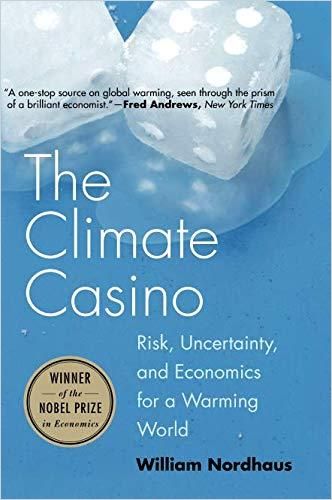Nobel Prize winner William D. Nordhaus details the complexity of the political and economic responses to climate change.

Stop Burning Coal and Start Pricing Carbon
Climate Change
The Financial Times selected The Climate Casino as a Best Book of the year and little wonder: Noble Prize-winning economist William D. Nordhaus merges the technical, economic and political aspects of climate change to offer an astute analysis of its effects in each of those arenas and in combination. Nordhaus also provides a remarkably clear and readable breakdown of how developed and developing nations might address the costs of climate change. Investors in particular will benefit from his comprehensive investigation.
Nordhaus explains that the science behind the assertion that greater amounts of carbon dioxide and greenhouse gases in the atmosphere trap the sun’s heat on Earth is more than a century old. The 14ºC [57.20F] average global temperature that the planet experienced in the unusually stable conditions of the past 7,000 years is changing. He delicately refers to contrarians and parties with special interests as those who resist the evidence of climate science.
Nordhaus argues that the Earth’s warming by a few degrees determines winners and losers, as temperate zones alter. He cites carbon dioxide as making oceans more acidic, sea levels higher, hurricanes more common, and species and habitats extinct.
Tipping Points
The author goes into detail on how tipping points occur as nature’s complex systems react to climate change. Little happens in the first period of global warming, but Nordhaus explains how, at a tipping point, feedback loops produce a step change in melting, making predictions more nonlinear and uncertain.
Most changes are likely to happen gradually, like a long freight train gathering speed and momentum. We cannot predict the impacts with precision, but they are unwelcome at best and dangerous at worst. And like the accelerating freight train, they will be hard to stop once they get under way.William D. Nordhaus
Nordhaus notes ominously that, with exposed land reflecting less heat than snow does and with greater water vapor in the atmosphere, relationships between cause and effect become disjointed and indirect.
A Carbon Tax or Cap and Trade?
As an economist, Nordhaus naturally focuses on the economic aspects of climate change. These sections of his book may daunt those unfamiliar with the language of the dismal science, but he states plainly that even many right-wing, free market economists support a carbon tax. He sees carbon emissions as classic negative economic externalities that harm every person on Earth and, even more significantly, future generations.
In economics, prices reveal and transmit the value of choices. A tax on carbon, the author notes, would emphasize to consumers and businesses how their decisions affect the emissions that contribute to climate change. It would give companies and investors incentives to solve emissions problems. Nordhaus posits that taxing carbon could spur investment and innovation that could save businesses and consumers money. A carbon tax could go into effect gradually and rise to compensate for greater prosperity in the future.
The author describes cap-and-trade policy as an alternative to carbon taxes. It entails national emission allowances or quotas that countries can exchange. Economists, he asserts, prefer a simple tax, while businesses and negotiators lean toward cap and trade. Cap and trade can produce a more predictable outcome but also greater insecurity and price fluctuation, which, the author worries, could negatively influence green investment.
Economics teaches one major lesson about externalities: Markets do not automatically solve the problems they generate. In the case of harmful externalities like CO2, unregulated markets produce too much because markets do not put a price on the external damages from CO2 emissions.William D. Nordhaus
Nordhaus is adamant on one point: replacing coal-fired power stations with natural gas installations. Coal produces high carbon dioxide emissions per unit of energy generated, but it is cheap, and coal-producing areas exert strong political pressure. Coal, he laments, accounts for 40% of global carbon dioxide emissions.
A Price on Carbon
The costs of regulations can be a hidden drag on the economy, but laws remain popular, the author asserts, because they face less public resistance than a more efficient but visible tax. It is simpler, Nordhaus reveals, to penalize carbon rather than to subsidize everything else.
Regulations for fuel-efficient vehicles and building insulation make sense, because, as Nordhaus says with considerable understatement, people are not always economically logical.
International Participation
The importance of global cooperation is critical, as lower participation ensures emission targets become impossible to achieve. If a nation with no carbon tax exports a high energy-cost product, like steel, to a country with a significant carbon tax, the excuse for tariffs would emerge, the author submits. Greater uniformity in carbon taxation policy is desirable and easier to agree on than discrete national emissions targets.
Obstructionists will find themselves as if on a melting ice floe. The political winds will eventually shift.William D. Nordhaus
Nordhaus asks whether poor and low-emitting countries should fight carbon emissions, despite the great cost to their underprivileged citizens. Europe is the only region to seriously raise carbon prices, though US president Barack Obama tried. Given the lack of global support, the 2012 Copenhagen agreement target of a maximum 2ºC rise in temperature might be impossible to meet. Nordhaus calls on nations to act to ensure that temperatures don’t go too far beyond this level.
Still Groundbreaking
Climate change has worsened since this groundbreaking work emerged, and even Nordhaus, for all his perspicacity, could not have predicted the United States withdrawing from crucial agreements and taking on climate change denial as official policy during the Donald Trump administration. Even so, his presentation of the foundational principles underlying the likely economic and political responses to climate change remains invaluable, and little in his work is dated. Addressing this topic in less academic language is Climate Shock: The Economic Consequences of a Hotter Planet by Germot Wagner and Martin Weitzman. Each book complements – but does not replace – the other.
Nordhaus is brilliant and operates at an intersection of complex fields. His language reflects his genius and requires concentration, but his multilevel insights repay any necessary effort.














